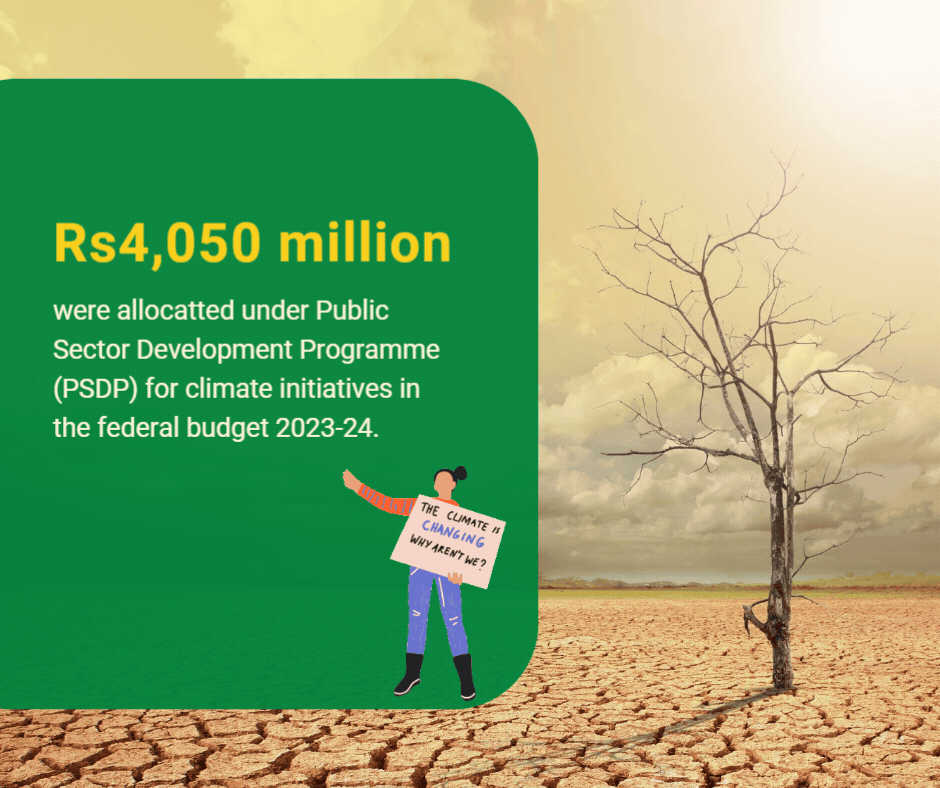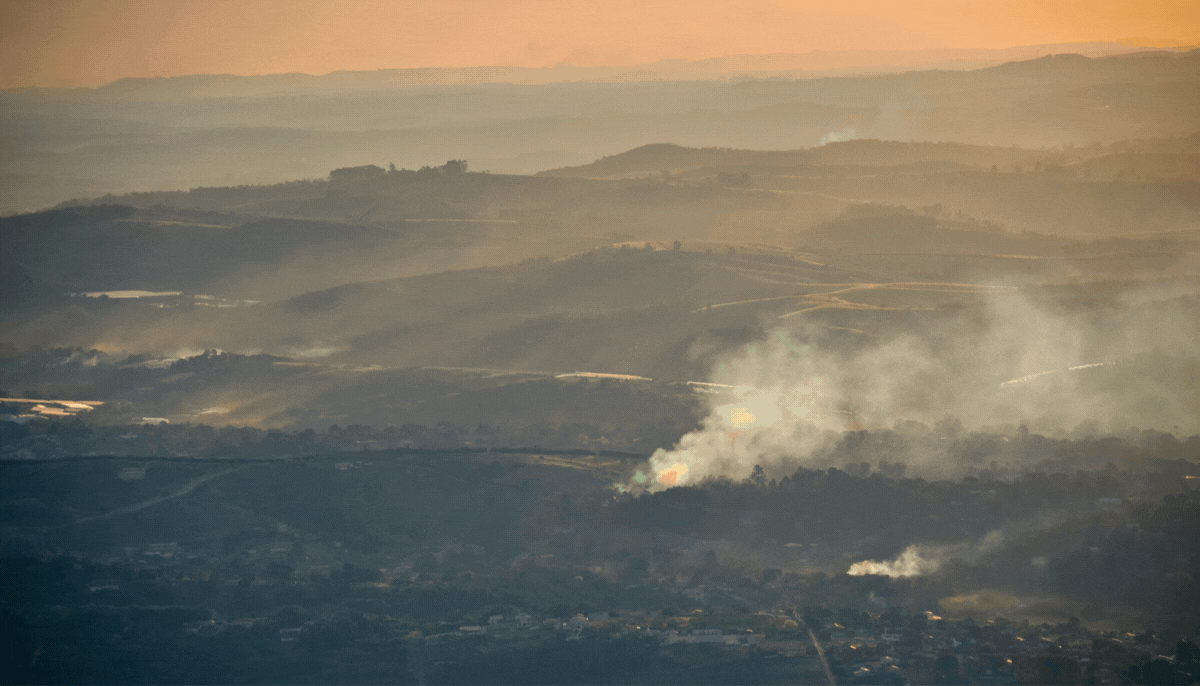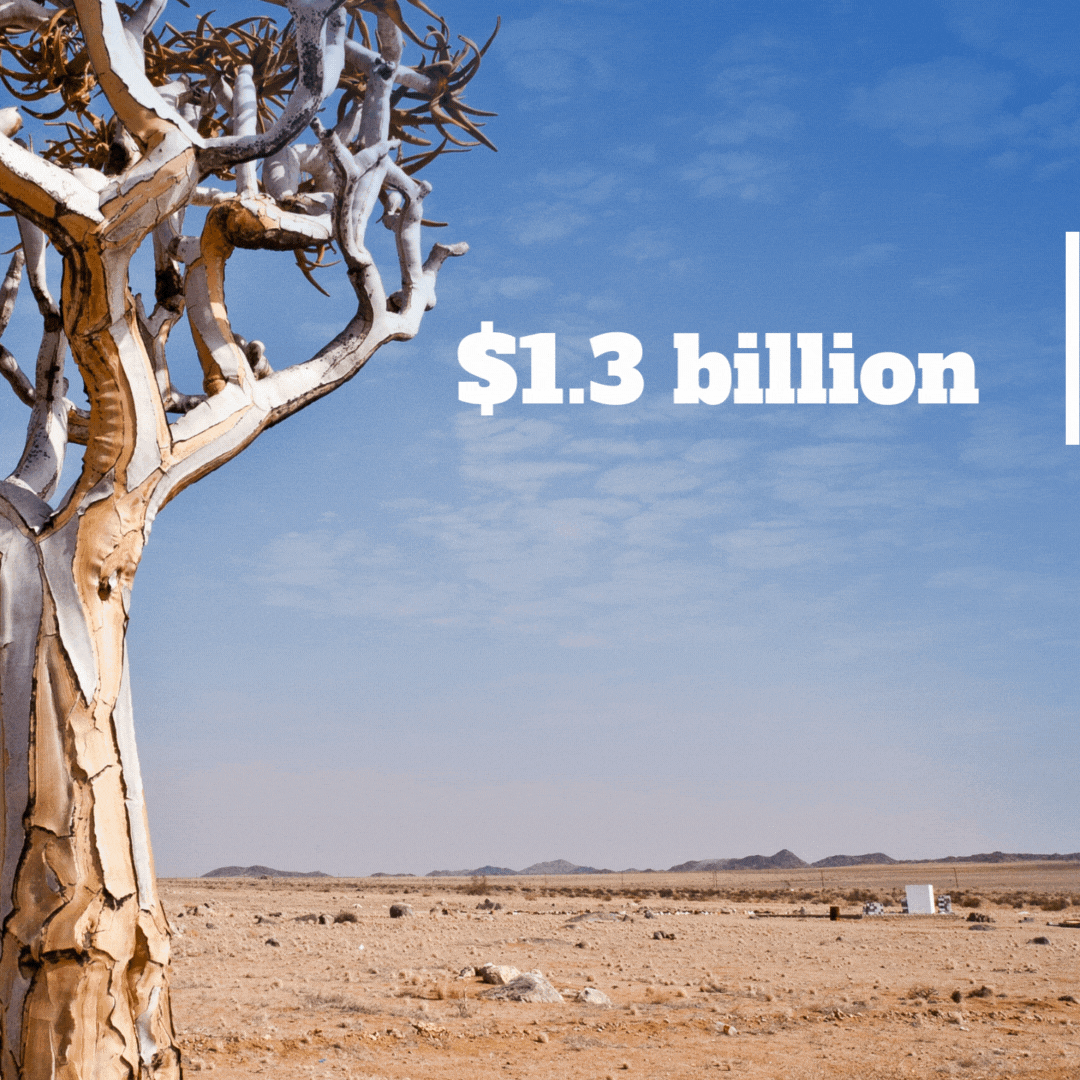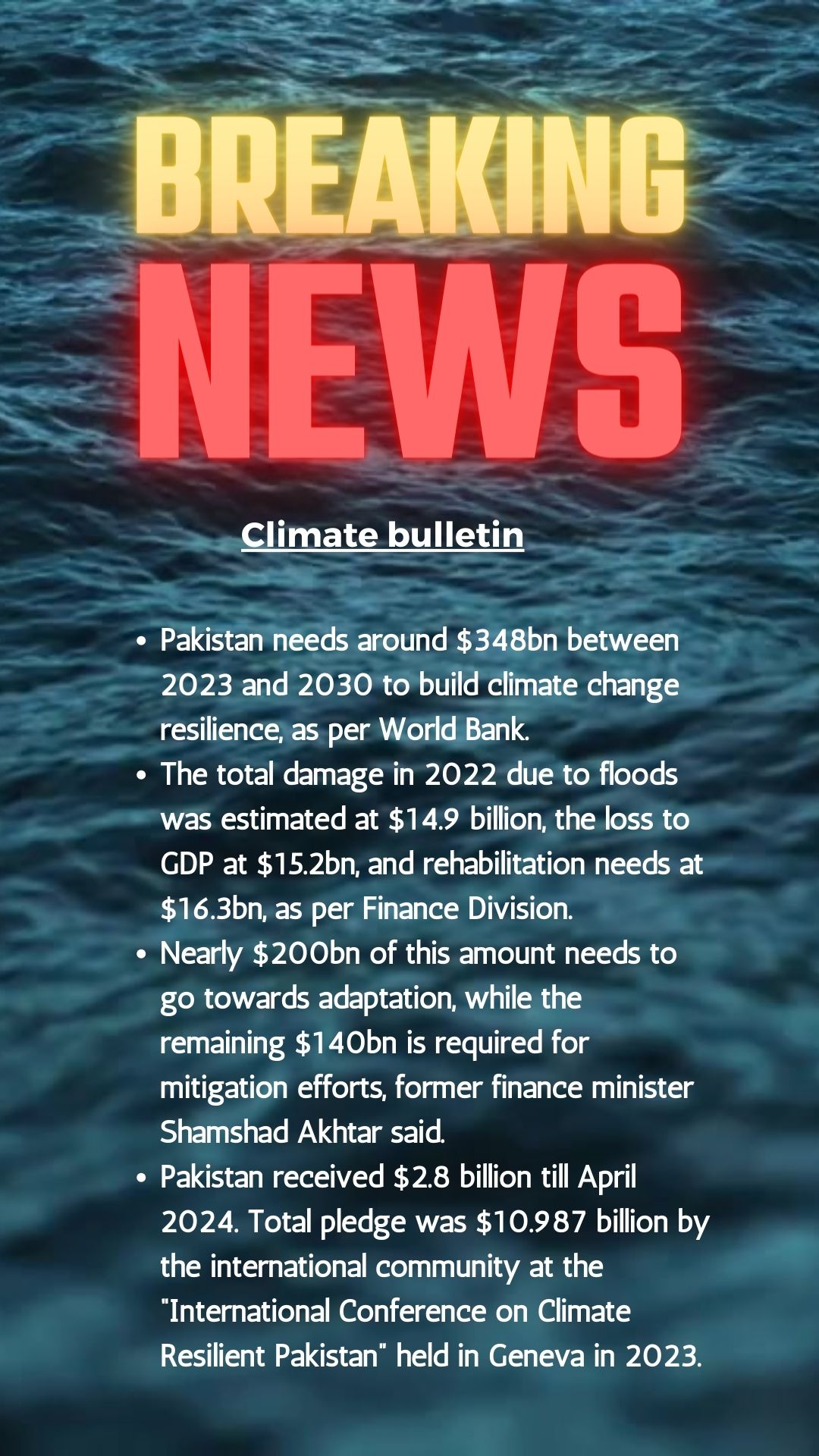Any climate budget 'change' for Pakistan in FY25?
Country needs a more comprehensive, well-funded, and politically backed approach to effectively combat climate change

The government of Pakistan seems to have recognised the looming threat of the adverse effects of climate change knocking on our doors; however, that realisation alone is barely enough as the infrastructure required to enforce constructive preventive measures is scarce.
The world in recent years has experienced worse natural catastrophes which are becoming more intense. Never has the world witnessed climate-related calamities simultaneously all across the globe as this century.
According to scientific research, it is all fueled by human activities that started impacting the world when industrialisation began in the nineteenth century. A large number of factories that were set up ran on fossil fuels and as their number grew, so did the emissions.
In our environment, everything is connected. When one element is affected by something, such as human activities, it can lead to adverse impacts. For example, crop-producing areas may suffer unprecedentedly damaging heat that jeopardises the harvest and threatens the food supply.
These impacts become so widespread that they transform the entire natural ecosystem of that area, and eventually, the entire planet Earth. We are currently witnessing these changes in the form of unexampled intense weather phenomena, related natural disasters, and ecological changes.
Climate change is a broad term that is often narrowly used and confused with hot weather, heatwaves, and severe weather conditions.

United Nations defined climate change as:
“Climate change refers to long-term shifts in temperatures and weather patterns. Such shifts can be natural, due to changes in the sun’s activity or large volcanic eruptions. But since the 1800s, human activities have been the main driver of climate change, primarily due to the burning of fossil fuels like coal, oil and gas.”
Human-induced emissions in the environment are causing the greenhouse effect. When sunlight enters the Earth’s atmosphere, some of the heat is supposed to be reflected into space. However, emissions from fossil fuels are creating a layer of gases in the atmosphere that traps heat, preventing it from escaping. This is how the Earth is heating up, creating a greenhouse effect, and impacting weather systems, seasonal cycles, and living beings.
We have seen that this shift in climate causes heatwaves, massive flooding, wildfires, severe droughts, landslides, and more. These effects are largely felt by poorer countries that do not contribute significantly to emissions but bear the brunt of its consequences. For instance, Pakistan's total emissions account for less than 1% of global carbon emissions but suffered an "unfair" share of its damaging aftereffects.
The major carbon emitters are industrialised countries such as the United States, China, India, the United Kingdom, Japan, and the G20 countries. Pakistan neither has the full-fledged infrastructure to implement its plans nor enough money to support its programmes to avert massive losses.
In 2022, Pakistan suffered one of its history’s worst floods that displaced millions, left thousands of residences waterlogged, and destroyed crops, pushing the already cash-strapped country years behind.
The then-foreign minister of Pakistan Bilawal Bhutto Zardari while addressing G77 in New York said: "One-third of Pakistan was under water. Over 1,500 people have been killed and thousands more injured. Over 30 million people have been affected and six million are destitute.”
Not only this but around 1.7 million homes, over 12,000 kilometres of roads, 350 bridges, and five million acres of crops, were devastated, taking the damages to more than $30 billion, according to the minister.

There are several reasons indeed but the two of primary importance are budgetary constraints and the lack of long-term political will to translate actions and policies into reality.
After the major flooding in Sindh, the International Conference on Climate Resilient Pakistan (ICCRP) was co-hosted by Pakistan in the early days of 2023 in Geneva in which countries pledged over $8 billion for reconstruction assistance to Islamabad in three years. However, not much progress has been seen in this regard.
Climate has become the foremost existential threat to Pakistan. In the upcoming budget, it remains to be seen what Pakistan pledges in terms of financial assistance and how much political will it devotes to translating the plans into reality.
Climate experts suggest that Pakistan do more to secure its foundations as a state because climate is damaging the country on multiple fronts. Not only internal displacement is a source of concern for Pakistan, but also the accommodation of the climate refugees and the resources to sustain them is a big problem.
In 2022, the World Bank in its report suggested a whopping $348 billion as a total investment required to build the capability and resilience to climate change.
In last year’s budget, Pakistan specified around $1.3 billion for its climate change implementation plan. Yet, it lacked transparency and it remains unknown how much so far has been spent.
In 2023, the World Bank in its report suggested a whopping $348 billion as a total investment required to build the capability and resilience to climate change between 2023 to 2030. Last year, the International Monetary Fund (IMF) also asked for transparency in its climate action plan.
“There is a need to be transparent on climate-related actions that have budgetary implications to support policy making and climate financing,” the global lender suggested in Islamabad.
There are concerns for which we talked to experts about what they think about the prospects of the upcoming budget and Pakistan’s capability to execute the strategy regarding climate change.
Talking to Geo.tv, Asim Jaffery, country lead of Fair Finance Pakistan, said: “This year, Pakistan's debt-to-GDP ratio is above 70% and interest payments on its debt are estimated to soak up a huge proportion of the government's revenues. Due to its huge debt servicing, the country can ill afford to divert its resources to invest in the recovery, health, and well-being of people affected by climate disasters like the floods of 2022.”

Underlining the shortcomings and domestic constraints, he stated: “The response to appeal for [aid] for floods of 2022 was met by just 28%, [which is] indicative that the scale of international response was insufficient compared to the level of need and the damage caused by the catastrophic flooding. Political instability, government change, missed allocations and debt trap add to Pakistan’s climate woes.”
“Hence whenever we face a climate disaster like floods, droughts or famine, we do not have enough funds at the federal, provincial, and local level to invest in essential services and to rebuild.
“The actual climate funding multilateral institutions and developed countries provide comes mostly as debt that has to be repaid. Pakistan's debt trap therefore hinders its climate resilience.
“Pakistan’s budget is climate blind. Pakistan’s climate budget debate should move from the national level to international climate finance architecture. The legacy of international climate finance from developed countries is often one of the promises not kept.
“About 71% of global climate financing comes in the form of loans, which means that they must be repaid, often with high interest rates. Countries that show ambition for climate finance often set no timelines and are not binding which potentially harm rather than help local communities, as it adds to the debt burdens of already heavily indebted countries like Pakistan.”

Referring to an actual debt that developed countries owe to the least developed ones as their development, he stated: “These promises should be binding principles and not voluntary. They must also have a timeline to relieve climate-vulnerable people from their suffering.”
Durlabh Ashok, who is running Climate Forward Pakistan, a non-profit told Geo.tv: “Budgeting for climate mitigation in Pakistan is critical, especially given the severe impacts we are already experiencing. The country's current contributions to climate change through unsustainable agricultural practices, deforestation, and reliance on fossil fuels highlight the urgent need for action.”
He suggested that Pakistan must prioritise enhancing funding for climate adaptation and mitigation projects, including investments in renewable energy, reforestation, and sustainable agriculture.
Strengthening institutional capacity to implement and monitor climate policies effectively is essential, along with integrating climate considerations into all aspects of policymaking.
To bring the debate to the local level, he suggested that the government engage with communities and in education, particularly involving youth, that can drive grassroots change and ensure that climate action is sustained over the long term.
While speaking about the political will to execute such long-term plans, he said there are mixed signals from the politicians.
“While there have been positive steps, such as the Billion Tree Tsunami project, a consistent and robust political commitment to climate action is still lacking. The approach often appears reactive rather than proactive, driven by immediate crises rather than long-term planning.
“Since the devastating floods of 2022, efforts to improve climate resilience have been made, but these measures are often insufficient and not fully integrated into a broader strategy, he said, adding that the focus has largely been on immediate relief rather “than building long-term resilience and adaptive capacity.”
The climate activist notes that the country needs a more comprehensive, well-funded, and politically backed approach to effectively combat climate change. Strengthening political will, ensuring long-term planning, and enhancing community involvement is essential for sustainable progress.”
In last year’s budget, Pakistan proposed around $1.3 billion to combat climate change. However, there was a lack of transparency, and it remains unknown how much of it has been spent so far. It remains to be seen what cash-strapped Pakistan will allocate for climate change in the upcoming budget for the fiscal year 2024-25.
The most important consideration is to envision the long-term impacts of today’s decisions. In such matters, statesmanship is required. The government should bring everyone on board and make them stakeholders to save the country for future generations.
The writer is a staffer at Geo.tv
Visuals and graphics by Afreen Mirza.




